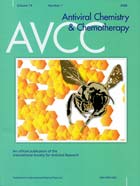[ 抗インフルエンザウイルス ]
- プロポリス含有フラボノイド類の抗インフルエンザウイルス作用
- 抗インフルエンザウイルス活性を有するプロポリスAF-08の活性物質の探索
- 抗インフルエンザウイルス活性を有するプロポリスAF-08の活性物質の探索
- プロポリスAF-08の抗インフルエンザウイルス活性画分の探索とその作用機序解析
- プロポリスAF-08の抗イフルエンザウイルス作用機序解析とその活性画分の検討
- ブラジル産プロポリスAF−08の抗インフルエンザウイルス作用機序の検討
- Anti-influenza virus activity of propolis in vitro and its efficacy against influenza infection in mice
- プロポリスAF-08の抗ウイルス効果
- プロポリス(AF−08)の抗インフルエンザ作用
- Anti-influenza virus activity of propolis in vitro and its efficacy against influenza infection in mice
- プロポリスの抗インフルエンザウイルス作用
- インフルエンザ感染症に対するプロポリスの治療効果
- インフルエンザウイルス感染マウスモデルを用いたプロポリスの抗ウイルス活性評価
- インフルエンザウイルス感染に対するプロポリスの病態改善効果
Anti-influenza virus activity of propolis in vitro and its efficacy against influenza infection in mice
2008年 Antiviral Chemistry Chemotherapy
- Department of Biochemistry, School of Pharmaceutical Sciences, Kyushu University of Health and Welfare
Tomomi Shimizu, Wataru Watanabe, Masahiko Kuroiwa - AMAZONFOOD Ltd., Atsuko Tsutsumi
- Department of Food Science, College of Food Engineering, State University of Campinas, SP, Brazil
Young Kun Park
Background:
Propolis has been used worldwide as a dietary supplement to maintain and improve human health. We examined whether ethanol extracts of Brazilian propolis exhibit antiviral activity against influenza virus in vitro and in vivo.
Methods:
Among 13 ethanol extracts screened in a plaque reduction assay, four showed anti-influenza virusactivity. The anti-influenza efficiacy of the four extracts was further examined in a murine influenza virus infection model. The mice were infected intranasally with influenza virus. and the four extracts were orally administered at 10 mg/kg three times daily for seven successive days after infection.
Results:
In this infection model, only one extract, AF-08, was significantly effective at 10 mg/kg inreducing the body weight loss of infected mice. The doses of 2 and 10 mg/kg were also effective in prolonging the survival times of infected mice significantly but 0.4 mg/kg was not The anti-influenza efficacy of AF-08 at 10 mg/kg was confirmed in a dose-dependent manner in maice.
AF-08 at 10mg/kg significantly reduced virus yields in the bronchoalveolar lavage fluids of lungs in infected mice as compared with the control.The reduction of virus yields by AF-08 at 10 mg/kg significantly corresponded to those induced by oseltamivir at 1 mg/kg twice daily from day 1 to day 4 after infection.
Conclusion:
The Brazilian propolis AF-08 was indicated to possess anti-influenza virus activity and to amelio-rate influenza symptoms AF-08 may be a possible candidate for an anti-influenza dietary supplement for humans.

